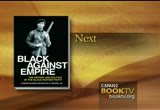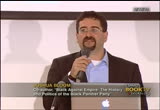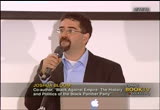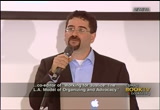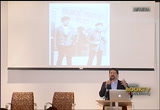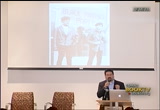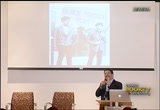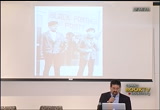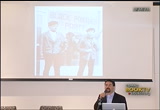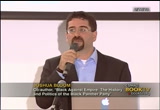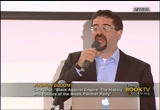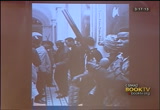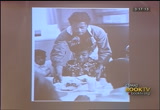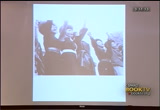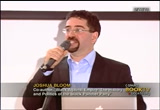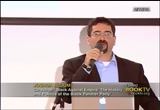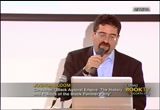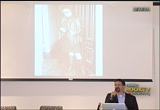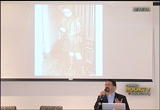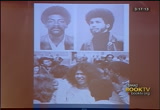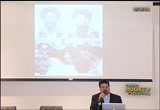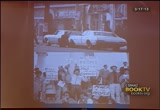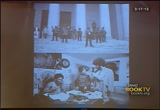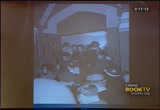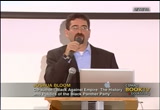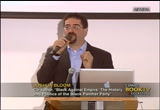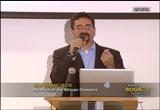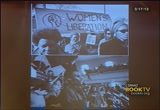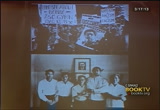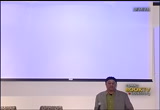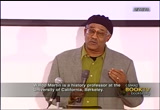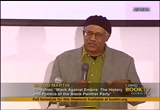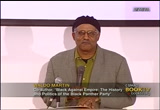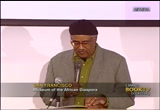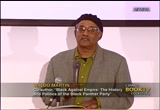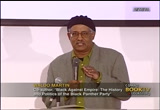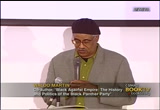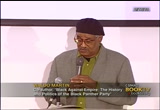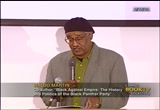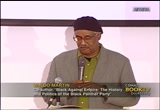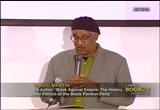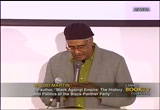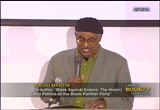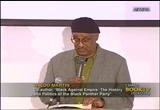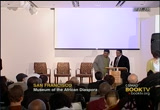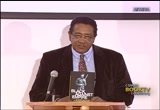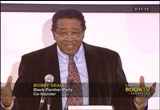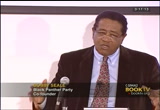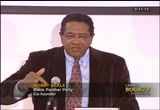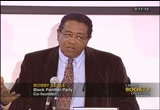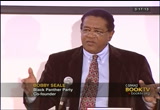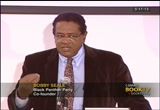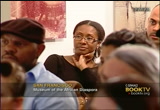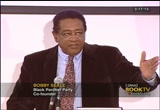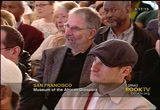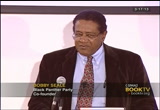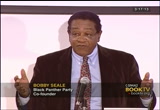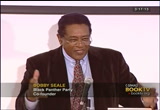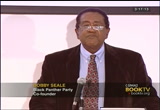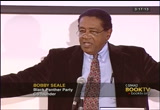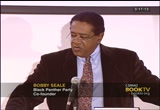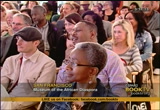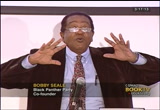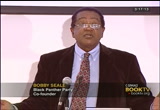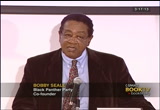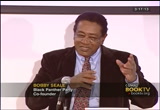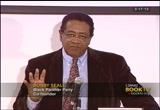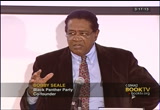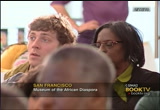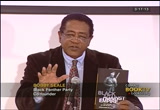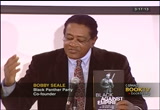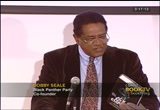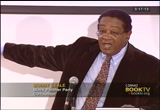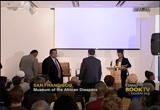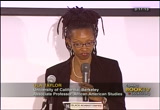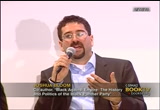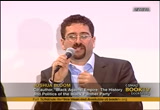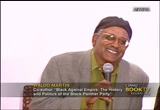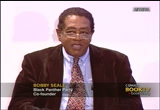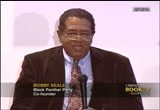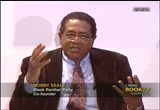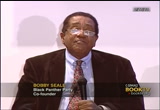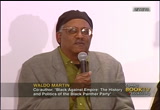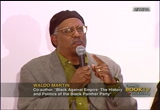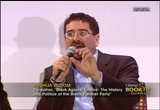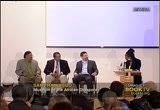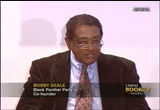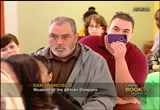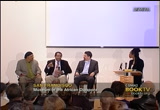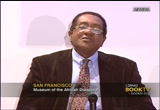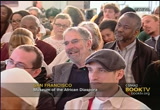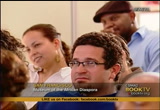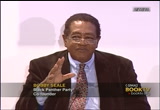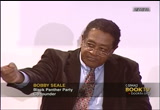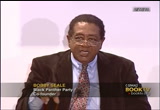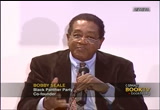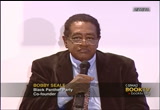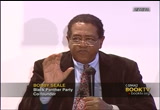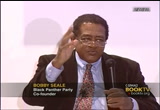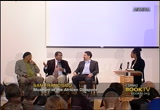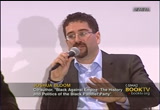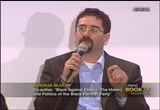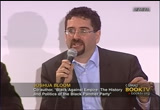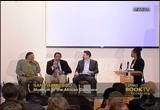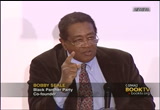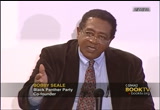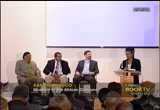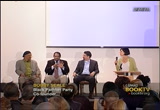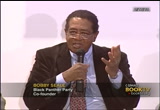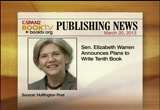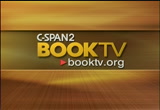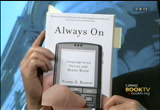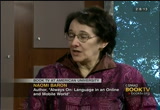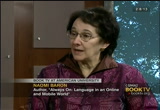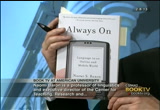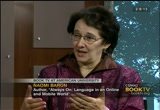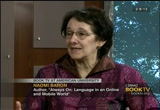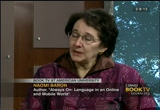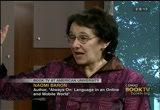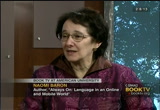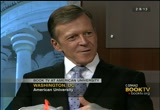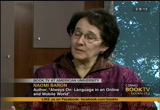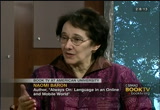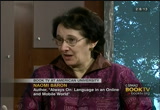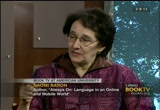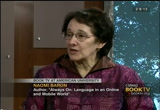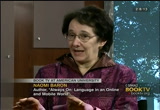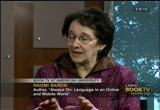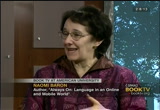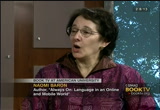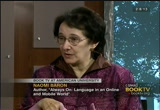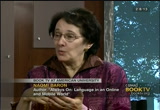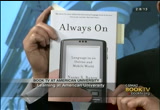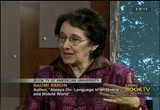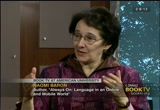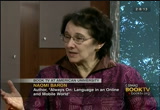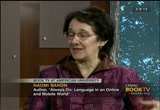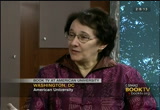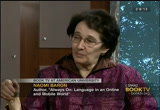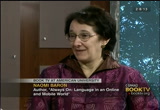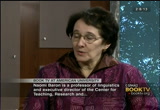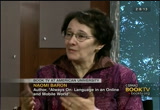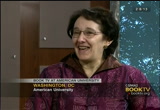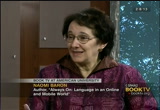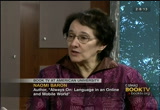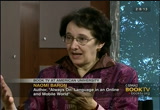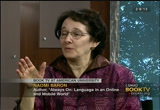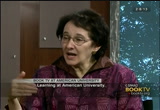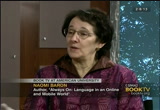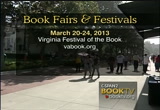tv Book TV CSPAN March 24, 2013 8:00am-10:30am EDT
8:00 am
>> up next on booktv, waldo martin and joshua bloom prison history of the black panther party. the authors recall the organizations cofounding by bobby seale and huey newton in oakland, california, in 1966, its proliferation of offices in over 60 cities across the country, and its political ideologies and inner workings. this is just under two hours. .. >> that really needed to happen. and i'd been an organizer a long
8:01 am
time, and he said, you know, you really need to turn this into a bigger project, and we worked together on this for 14 years. he's been there every step, you know, it's been an amazing partnership, so thank you, waldo. i want to thank professor taylor for coming and moderating this event. i want to thank billy x who's here, the chair of alumni association. it's about tomb for the -- time for the black panther party and other former panther or members in the audience. and i want to give a very special thanks, i'm very honored, and we are very lucky to have here with us tonight chairman bobby seale, the founder with huey newton of the black panther party. and chairman seale is in the process of producing a film, and it's going to be a very important film. there have been several films about the panthers, different aspects, but they really haven't
8:02 am
done justice to the broader history, and so this is a really important project that chairman seale is taking on, and we're very fortunate he's going get a chance to talk to us all about that as well. so he's going to be coming up as a special guest after, after waldo. so let me jump in. this is a, it's a big book, and i'm not going to take a lot of time here, but i want to give you sort of the outline of the project and our argument, and i'm going to run through some of the photos. we're lucky to have 50 photos in the book, a few of them here and i'm going to share with you tonight, this afternoon. so we really started this project asking why in this moment in the mid '60s after the tremendous success of the civil rights movement and really the demonstrative power of nonviolent civil disobedience and claims of participation and citizenship, why in this moment
8:03 am
did the black panther party challenge america as empire? why did this politics become so influential and important? why did so many young revolutionaries in cities throughout the country take up arms and dedicate their lives to revolution and the black panther party? so i'm going to touch on a few themes that we develop in the book just to give you sort of a taste of some of the pieces of the answer here. the first thing is that one of the things that was very surprising to me when we started to look at this is that in the mid '60s there were debates, rigorous debates happening in cities throughout the country, l. a.m., san francisco and oakland, chicago, new york, a real ferment, a black power ferment of people asking how do we take the gains and the successes and the power of the civil rights movement, and how
8:04 am
do we translate that into the kind of power that can challenge poverty and ghettoization. the civil rights movement had been incredibly successful at dismantling formal segregation, but what it didn't do, is it doesn't provide an insurgent means to transform poverty, it didn't provide a way to change ghettoization, it didn't reach the full goals that the participants in the civil rights movement were really aspiring to of freedom, of power. and so what you had in the starting really in '66 it became a very big call was a question, black power. how do we build black power? there were dozens of organizations in most major cities asking this question and trying to thub it. think about it. there were a lot of different kinds of approaches. one important kind of theoretical answer to this was to say we're not just going to, you know, it's not that we just
8:05 am
want to be part of america. america as it's constituted is an imperial power, and we need to challenge that imperialism as part and parcel of the colonial struggle not only in africa, but nationally. so there were organizations in the bay area asking that question on a small scale. one organization called the rove louis their action movement, both bobby seale and huey newton participated and drew a number of ideas from there, but there were different kinds of answers, right? and nothing had really emerged to tap that power of disruption. and what huey newton and bobby seale did that really started to provide an answer to the black power question was that they created a way to stand up to police brutality. and if you think about that moment, '65, the watch rebellion, there'd been urban
8:06 am
rebellions all across the country, and some of them very large. and these were really expressions of resistance to containment policing strategies. you had had mass i have migration of black folks to cities in the north and the west, and the jobs that had attracted people during the wars had fled with white flight also, and municipalities had responded with containment policing. we're not going to deal with poverty or get toization, we're going to contain it. so you had many young people living in ghettos who were just really being brutalized and fed up with it that didn't necessarily have recourse through institutionalized channels. you have to remember that at this moment despite the triumph of civil rights that you had only six congressmen, nationally who had been elected as national congressmen. you had very little access of black people to elite
8:07 am
universities. you had almost exclusively white police departments not only in the bay area, but in most cities in the country. and fire departments. and exclusion from the political apparatus and machines, right? but on a local level, there was very little electoral representation. so in this moment the reality was that there was very little institutional recourse, right? and so people were asking how do we, how do we do what the civil rights movement did? how do we through standing up and making businesses possible, how to we do that? now, initially, those armed patrols were completely legal. they had studied the law, they knew at what distance they needed to stand, when the guns could not be loaded in the cars, that a felon could not carry a
8:08 am
handgun. all the very specific legislation around when and where it was legal, and they emulated some tactics that were being done in l.a. and started to patrol the police and stand up. and in this drew a local following in oakland of young adults who said that's power. that's standing up to our press sor. we're going to join in. we're not going to just sit there and talk about revolution like the revolutionary action movement, but this gives us a way to actually stand up against brutality. when this really changed to a bigger scale, right? there were these small patrols in oakland standing up and following the police and patrolling the police, when this really changed was when a young man was killed in north richmond, an unincorporated area knot of oakland. -- north of oakland. neighbors -- he was killed by
8:09 am
police, shot in the back, and there was a lot of evidence that this was unjustified murder. but there was no official recourse. people tried petitions, they tried talking to the politicians, they tried talking to the sheriffs and, basically, the story was, sorry, you know? you know, we're not going to do anything about it. and the standard civil rights organizations didn't have a response. finish so some folks called huey newton and bobby seale, and they went up with allegations, and pretty soon you had not one, not five, not ten, but hundreds of black people rallying in north richmond and bringing their own weapons and saying we're going to create our own governance. so this puts the whole party on a different scale. pause now this is seen as a -- because now this is seen as a
8:10 am
threat. what happens is the state says, okay, we can't have that, we're going to change the gun laws and restrict the right to bear arms. and interestingly, the nra in this period is in favor of restrictions on second amendment, and, um, ronald reagan and the assembly pushed true this legislation -- through this legislation to restrict the right to bear arms and make this initial strategy of policing the police that had built political power, um, the panthers had used to build political power impossible. but this really, this puts the party on the map. chairman seale and a delegation of panthers go to the assembly and protest this legislation. they go armed. this is before the law is passed. and newspapers all over the country, all over the world all of a sudden know about the black panther party. this is huey newton and the
8:11 am
wicker throne. i'm not going to have time to talk in detail about a lot of these picture cans. i want to make a few key points. another key piece of what the black panther party did, if you look at the program and compare it with malcolm x's 1963 program, there's some important differences, but there's a lot of learning and development, right? the idea is that the black panther party said we are the legitimate representatives of the black community. the united states does not govern in our enters, the community has to govern in our own interest, and we're going to, we're going to take that on and make that happen. and the idea was not just about standing up to the police. it never was from the beginning the party was very much about community stewardship and about local self-governance and community self-governance. and while the initial development of party and the
8:12 am
spread was really through the strategy of armed self-defense, a lot of what became really the center of the party's practice in '69 and onward was free breakfast for children and community programs that were really about taking care of the community. here you had the war on poverty, federal law proclaiming the war on poverty, and yet you have children starving here in the united states, the wealthiest, you know, country in the world. and so the black panther party took it upon themselves to say, you know, we're going to feed the children in our community. these are some of the breakfast programs. they had liberation schools. this is, the top picture is new haven free clothing program. i want to say a word about gender and the party. the party has been, was attacked by the federal government not only as an organization, but really the history, the history and the political possibility of the party was attacked.
8:13 am
and if you look at the memos and documents of j. edgar hoover's thinking about the threat of the party, it makes it very clear that the challenges to really make the party impossible to support for its allies. and you look at, there's -- just to give an example, illustration, a memo from the special agent in charge in san francisco who writes to hoover and says, you know, hoover's directed him to, you know, create a program to attack the breakfast program in san francisco. and he says, you know, this program has all kinds of support from the black church and these liberals, and shouldn't we really, you know, leave the program alone and focus on this, you know, part of the politics? and hoover gets back with this scathing memo, and he says you've missed the point.
8:14 am
you've missed the point. the point is exactly that these are the programs that have support from the black community and from nonblack allies. and that's exactly why they need to be destroyed and vilified. and so the whole intention is not just the construction of the party as an organization, but its vilification can. and this is played out in a lot of ways. one way i want to touch on briefly is in terms of gender politics. there was a very heavy attack on the party. black macho and mrs. superwoman where, you know, angela davis was called a do it for your man revolutionary, and drew jordan and others came back and really tore the critique apart. but that line, that line of attack that says the party was, um, really epitomized misogyny
8:15 am
and patriarchy is a distortion. i don't want to go too far in the other direction. i think it would be not a reflection -- you know, some people want to get up and cheerlead and say the party was perfect, and gender dynamics in the party were great, and there's some really, really strong writings, sort of theoretical writings by the party that take strong stances on both gender and sexuality. look at huey newton's 1970 essay. but, um, you know, the reality was very complex. and one of the things we try to do in the book is to pay anticipation to some of the specifies cays -- attention to some of the specificities. let me give sort of a nutshell assessment of how we see gender playing out in the party. the party started, it did have a sort of strong masculine project in the sense that this was about
8:16 am
standing up to the police and being proud of black masculinity and not being deterred, right? and we're not going to be pushed around, right? and many of the members in the party early on were men, but also very early on in the party there were women, and what happened as happens in most organizations, right? is that over time women became more and more really the center and the backbone of the party and the party work and increasingly became really the folks who ran the party day-to-day on the ground. this is a group of women panthers rallying in, these are -- they're rallying in oakland, these are women from sacramento. there were also armed women in the party. this is kathleen cleaver in '68. but one of the interesting things, you know, there's been claims that early in the party there weren't armed women. that's not true. women were armed in the party from the start. if you go back and look in the black panther or newspaper in that first image of huey newton
8:17 am
on the wicker throne, there are images from that first photo session of armed women panthers posing with guns as well, and there were women in the delegation from sacramento. so, you know, women played a variety of roles and were central in the party throughout its history. what happened was, right, the party had all kinds of problems, you know, in terms of gender dynamics because the society does, right? and in many ways struggled with those issues very try lently -- stridently. and so if you look in the paper, there's all kinds of debate about gender dynamics with lots of voices from rank and file panthers, mostly women, also some men really debating gender dynamics from early on in the history. if you look at the 1969 fascism conference, part of the conference was a panel on gender dynamics which ended up being this contentious sort of center what the conference ended up
8:18 am
being about. so these issues were heavily debated, and i, i'm not, i wouldn't, i would be the last person to stand up here and say that the party, you know, had gender dynamics all figured out. but what i want people to understand was that these issues were complex, and they were contested from early in the party. there were a lot of women who were really running a lot of the party from day-to-day from early on in its party history, and certainly i think the party was well ahead of the society at large in debating these issues. i'm going to go very briefly through, you know, what happening is that following really the fascination of marthe -- the assassination of martin luther king, the party explodes, and it spreads from, you know, basically an organization until february 1968, first chapter outside oakland opens in los angeles, and that's pretty much it until
8:19 am
april, and within, by the end, by 1970 you have chant ors and -- chapters in 68 cities throughout the country. 68 cities. and most of those chapters with dozens, in a few case, thousands of members who have dedicated their lives. we're not just talking about going to a rally, but saying i'm going to be a panther. this has spread to 68 cities throughout the country, and most of that membership -- those are people who come to the party saying we want to be panthers, right? you have your finger on the solution to what black power is. we want to be a part of that. and the party has to actually turn down a lot of people and put some brakes on that and try to control the process of growth, because it's so quick. let me make one other point. i'm going to run through these cities and show these dynamics visually in the different cities. but the repression of the party started from the beginning and
8:20 am
got very heavy by '68, right? and here the most intense repression if you count in terms of deaths or armed conflicts was '69, those were the years the party grew the most quickly. so there's a puzzle there. there's a puzzle there, right? it wasn't just repression that ended the black panther party, right? the party had some resilience to it. here you have los angeles. this is on the top front, carter, john hug givens, on the bottom, erica huggins. they're killed in january '69, and the party in los angeles continues to grow very happenedly so that by the end of -- very rapidly so that by the end of '69 you actually have december 8, 1949, you have a mini war on 41st and central where panthers are defending the offices, um, and the first
8:21 am
s.w.a.t. teams, hundreds of police with military weapons are actually bombing the offices and firing, you know, not just from rifles, but from carriers into the building. and they hold off the attack for six hours. here's major mobilization. this is just to give you -- look at the faces. these are not panthers or even potential panthers, many of these folks, in the picture at the bottom rallying after this attack. over 10,000 people rallying, many of them are middle-aged, many actually have more moderate politics. here's some of the prisoners from the l.a. shootout. this is seattle. fred hampton, very vibrant leader from chicago, is assassinated in his bed by the local police working with the
8:22 am
fbi. and organizations like the urban league and the naacp turn out in force in protest. here's on the top a rally in new york, on the bottom limo, ohio. who knew that was a national community that would combat fascism? lima, ohio. here's washington d.c. detroit on the top. new orleans, you see a raid here. below, philadelphia. omaha. this is just to give you a flavor of some of the sort of spread of the party. so i want to close with just a couple words about, about why and what that might say more generally about insurgent movements. you know, there's different
8:23 am
kinds of politics, and a lot of political power is built from below and people n, and they work with each other, and they do organizing work. and, um, but there are only, there are limits to those kinds of power and those kind of organizing. institutionalized power usually is used to build and consolidate power for people in charge of those institutions. and so there are many moments in history where people have been able to make a transformative change not through the slow process of networking and organizing, although that's been a part of it, but they've tapped the power of disruption. and that's what you see in the civil rights movement, right? the line was we're going to take the slow road, right? and eventually segregation will, you know, sort of wither away, right? there were lots of politicians that said that, but the civil
8:24 am
rights insurgents weren't going to wait, because they knew that waiting might not get them where they needed to go. so the civil rights movement, you know, they actually put their bodies on the line, and they stood up to power, and they disrupted business as usual. and the party did a similar thing, right? in a very different way, right? the party wasn't saying we want to be a part to have the united states, it wasn't saying we -- [inaudible] you know, that budget working to challenge poverty and get toization and police -- ghettoization and police brutality. what the party did was tapping the power of disruption. they were saying we are not going to sit by and get brutalized by the police, we're not going to sit by and wait for government handouts. we're going to govern our own communities, and we're going to take that power into our own hands. what the party did was they were able to pose that politics in a way that drew allied support in the face of resistance. so, like, you think about the
8:25 am
naacp and the urban league turning out after fred hampton was killed in chicago, they were not supporting the party, but they also knew there was no access or very limited access to elite higher education, that there was very little electoral representation, that there was extreme poverty, that there was not representation on the police force or in the political parties, they knew they didn't want the young activists who were standing up and doing something to get kill inside their bed and that that was of a threat to them as well. what the party did was articulate politics that not only drew support from more moderate black politics, but also drew support from other nonblack groups in the united states and internationally, and that support was crucial to being able to sustain on self-defense and the revolutionary imperialism of the black panther party as a source of power for change. i'm going to run through a few sort of examples of some of the
8:26 am
allies here. this is, um, the young lords apparently, a puerto rican organization that emulated the black panther party in new york after they took over. they wanted to run a breakfast program and ended up doing a big takeover of a church in their neighborhood. working with many of the church members because they couldn't get space to run their breakfast program, and it ended up they got a lot of support and were able to run their program. here's an allied mobilization from women's liberation movement in support of freeing erica huggins in new haven. here's david hilliard talking at a rally in yale in new haven. a lot of the key supporters, if you look off at like who were the lawyers and who were, um, buying the papers and some of the supporters for the program, there were a lot of, a lot of anti-war folks, right?
8:27 am
who were nonblack, who saw their own states threatened by the vietnam war and in particular the draft, and the party really became a lightning rod where a lot of those folks provide really key support for the party. so here's a rally. you see tom haven and david dillinger and a whole bunch of yale students shutting down yale university in support of bobby seale's trial. here's berkeley, here's chairman seale at his trial. here's a rally for chairman seale in sweden. hundreds of people in sweden mobilizing to free bobby seale from prison. you would dribbling cleaver -- el dribbling cleaver working with the liberation army offered an exchange of about a hundred
8:28 am
p.o.w.s for the release of bobby seale and huey newton from prison. and the premier of china meeting with huey newton when huey newton went -- there were tens of thousands of chinese rallying in the street with big signs saying down with the yankee oppressor. so i'm going to end it there and turn it over to waldo martin who's going to put this in a prodder context for you -- broader context for you. thank you. [applause] >> first off, i want to thank elizabeth for putting this program together. um, like josh this has been a longtime labor of love, but it also was struggle, and i have to
8:29 am
acknowledge that josh's energy, his brilliance and his commitment made this project. i wavered. josh would say, get up, brother. [laughter] and he was the key author, he was the principal author. and he laid down the tracks, i'd come in and throw in some drums, throw in, you know, a lit old of this -- a little of this, a little of that, we pushed it around. and after a while we said, hey, this is a book. so i really want to give kudos to josh who is the principal author and i am, indeed, a co-author. but a lot of it was these conversations that we had over the years in person, on the phone, hours where we worked through ideas, where we talked about how this particular history might be written.
8:30 am
i also want to pay how many imagine to chairman seale -- homage to chairman seale here. i look forward to what he has to say. needless to say, as a genuine more than hero and thinking about how we treat people who have given their lives to better not only america, but the world, you know with, he's one of those people we need to honor. also i want to thank all the party members and fellow travelers and sensitive and empathetic folk who are here and folk who just decided i wanted to be here. what i want to do is in a, hopefully, brief way say a little bit about the context, sort of the scholarly,
8:31 am
historical context that we worked in and what we were trying to do because we not only are sort of academics, but we see ourselves as people in the real world. we wanted to write a book that most people could pick up and read and be excited about. so that's what we aimed at. not sort of a dry, scholarly tone that, you know, would only be good for propping up a door or something like that. [laughter] no, we wanted it to be a book that would engage and stimulate. but also to take the party very seriously. to suggest that how most americans think about the black panther party needs to be radically revised is a vast understatement. and i have to, i have to sort of pay attention to my text, otherwise we'll never get out of here. i'll start preaching, which we don't need. in fact, the black panther party, in our way of thinking, was an extraordinary revolutionary movement that
8:32 am
added hype, fought valiantly for root and branch change, systemic change, change from the bottom up, grassroots change. they sought this in the capitalist political economy of the united states and, indeed, they sought and united with those engaged in systemic change in international political economic arrangements. the black panther party fought for a domestic and a global socialist system committed to the kinds of things that everybody in here cares about; equality, justice and human rights. from where josh and i sit, this is the historical truth. fighting for revolutionary change is extremely difficult, it's often very, very messy, and the history and politics of the party confirm these particular
8:33 am
positions. but when we go to the dominant historical narrative, the dominant popular cultural narrative that shape how many, perhaps most americans think about the party, you run into a barrage of of misinformation and misinterpretation. and it's imperative that we understand that. and as josh was sort of laying out sort of the official vilification, the official denigration and how that then folds over into the history and popular culture. so in popular understanding, for example, among a lot of people the black panther party with its ultra black radicalism and its gun-toting thug ri -- and i get this from my mother whom i love, right? so i know it's out there. killed off the beloved community of the civil rights movement. put another way, the black
8:34 am
panther party epitomized the bad black '60s as distinct from the good black '60s when black people were nonviolent, civil disobedience getting knocked in the head committed to immigration and interracialism, what i call the "kumbaya" movement of the civil rights. which is totally off base, right? the bad '60s led not only to the unraveling of america, but the death knell of the civil rights movement. as a historian, this reminds me of that salacious, old school view that black reconstruction after the civil war actually killed off reconstruction. you know, when black people started participating in politics, actively trying to take control over their lives, this was the problem, okay? and we see this happening in the
8:35 am
way many which a lot of scholarship and a lot of popular culture treats the party. the party is blamed for the violence that others perpetrate against it. it is blamed for the errors and wrongs that others perpetrate against it. you know, the victim is, you know, being victimized, right? so we vigorously, obviously, dissent from this kind of view. what we argue instead is that the party helped spearhead and further the expansive growth and the explosive growth of the black freedom struggle in the late '60s and early 1970s. in our view the party helped push forward, in crucial way, the struggle. they epitomized back power, they were very different in fundamental ways from the civil rights movement, but obviously they built on that movement. also as josh began to lay out,
8:36 am
several myths must be put to bed. first, the party's brand of radical black nationalism was liberationist. of it was neither integrationist nor separatist. and it was certainly not separatist as many accounts wrongly suggest. the party was keyed and, you know can, based on coalitions of progressives and other people of color and like-minded folk whether they were black or white interested in a similar kind of politics. the party was humanist, it was anti-racist, it was open to working with progressives and nonbrachs including white concern nonblacks including including --ing nonblacks including people of color.
8:37 am
wrong in pernicious in theory and practice. the revolutionary plaque nationalism was broad and inclusive. it was not narrow, it is not sectarian. another way you encounter this in the american mind is sort of this notion that the late '60s/early '70s, you know, sort of this unraveling, sort of this attack on american empire represented the triumph of good over evil, right? evil. when, in fact, the bulk and majority of the evil is being perpetrated by the empire, right? and so once again, you know, the power of the state and the power of mainstream historians and conventional sort of narratives are used to vilify the party. what josh and i spent over a decade doing was what scholars
8:38 am
do. we sifted the evidence, we spent years working through a whole range of documents, and what we tried to do was to offer a historical assessment that is clear-eyed but adown narrative to this -- a counternarrative to what i think and josh agrees is sort of this dominant historical narrative which seeks to misrepresent the party. and what we try to do is not only provide a counternarrative, but what we think is a more accurate narrative. and we think about the party in a variety of contexts. the party as the most important expression of black power politics in this period. it's a commentary on the relationship between the civil rights movement and sort of
8:39 am
black power, sort of this notion of an enduring black freedom struggle, how do you situate the report in that. sort of the transform ty moment of the late '60s, early '70s. finish so to reiterate two points that josh has already laid out so eloquently, first, we emphasize that the party's anti-imperial politics were the most important reason for the party's period of explosive growth, and its greatest impact in '68 through the early '70s. second, we show that the party's growth and impact owed to its ability to improvise and sustain a set of political practices and ideas that created a broad base of allied support for the party among a broad range, among blacks within progressive communities of color, among liberal and radical whites and internationally.
8:40 am
we also want to acknowledge that we aren't the only people who have ever written books on the party, right? this is an expanding body of work -- there's an expanding body of work. and we read literally everything that we could get our hands on. so what we do is we not only read that material, but we created our own understanding and offered our own views of sort of the history, but a history of informed by this large body of work. so the way historians talk about it, it's a synthesis. it tries to bring together all of that work, and it tries to put it in perspective. but reducing the book to its essence, what we try to do -- and i think we do an okay job here -- is provide a serious, we take politics very seriously. we take the politics of the party very seriously.
8:41 am
whether you disagree with the particular tactic or strategy, um, this is what made the party. you know, there are various ways one might present the party, but for us the party was ultimately about its politics. the final thing that i want to say is that this was a moment in history that's very different from our moment, right? one of the key things we try to do in the book is to bring to life why, how and with what consequences the party spearheaded and contributed to a revolutionary moment, right? one of the challenges that we accepted and labored hong and hard to meet was to -- long and hard to meet was to capture and represent in as compelling a way as possible that historical moment, the late '60s and early '70s, when global revolution, even revolution within the united states, seemed
8:42 am
desirable and even possible. our present historical moment, as you know better than i do probably, is very different, right? unlike the late '60s and early '70s, today as we sit in this room in 2013 while millions around the globe and many even in the united states might desire revolution, the sense of revolution as possible stalls. and the sense of revolution as impending is lacking. in black against empire, we try to recreate as vividly and engagingly as possible the history of a by gone era that is still very much alive even though all too often wrongly and mistakenly in historical memory and consciousness as well as popular memory and consciousness, you know, presented in ways that we fundamentally disagree with.
8:43 am
and the final thing i want to say is, it's a good read, okay? [laughter] as a historian committed to a narrative and the art of storytelling, okay? we tried to write a book that, you know, you would want to buy and actually read. [laughter] so it's a page turner. [laughter] without further ado, i want to give the microphone over to chairman bobby seale. [applause] [inaudible conversations] >> thank you, thank you. right on time. this book, let me tell you, i
8:44 am
mean, i read -- i remember reading this manuscript a year before it was out, and it really helped put together a structure and understanding of the politics and our history. but the politics and as it's interconnected and interrelated with how the fbi and its copro from the president of the united states on down, at the time we're really talking this heavy point of this was richard m. nixon because he was the one that blacklisted. in the film that i'm producing that we're going to produce, we have an indigo campaign to raise funds for our initial development funds before we get to hollywood down there -- we've already been to hollywood once, but my point is this here: we, in our research, we got ahold of what was now public watergate
8:45 am
tapes, watergate tapes. remember nixon used to tape everything? tear public access -- they're public access now. and we got ahold of one where j. edgar hoover is talking to richard m. nixon in their own voice, and j. and richard m. nixon, oh, did you talk to mitchell? mitchell's united states attorney general at that particular time, about the panthers. we've got to get rid of these black panthers and so and so. yes, sir, says j. edgar hoover, i will definitely talk to him ask and so on. it's important to understand this. this is your united states government right on down. and when you start talking about what the black panther party was about, how we involved, i -- we evolved, we popped up right in the middle of an already ongoing nationwide protest movement, the anti-war protest movement can
8:46 am
and civil rights all across this country. we popped up right in the middle of that. founded the black panther part october 23, 1966. that was the day we named it. had to search and find a name, and we did find a name. and we decided to go out and patrol the police as our first issue. but this ten-point platform looked at the whole thing. we was talking about, as i had discussed with huey numerous times up to that time, we are going to organize a mass membership organization. we're going to organize and unify the votes in the community, and at some point we're going to be able to have enough people vote so we can take over those political seats. we need those political seats. you can't just run around talking about black power this, plaque power that, and you ain't going other the political seats. they're very important. my analysis and huey's analysis, when we look at what happened in
8:47 am
1954 with rosa parks, huey's in law school too, and i'm looking at that and saying, wait a minute, you know what this is about? there are some racist legislators who made racist laws who said we had to get up and move to the back of the bus, you had to get up and give that white person that seat. but you have to read leon higgingbotham, a federal court justice in philadelphia. his latest book was shad coes of free come. -- shadows of freedom. but he articulates and shows you a history of how laws are made in the country based on the precept of white supremacy, connected with another precept they had of black inferiority. this is how the laws are structured. and in that context you can see
8:48 am
the laws being the backbone and the structure, the very structure of institutionalized racism in america. and all its discriminatory and racist practices, etc., that's what it was about. so here we are, a new organization popping on the scene with this kind of analysis looking at this stuff. of and i'm telling huey -- huey said we need to capture the imagination of the people, so we decided to patrol the police. but really our patrolling of the police, we were imitating another group down in los angeles. the only thing that other group done in los angeles, they didn't have any guns to defend themselves. they had law books, they had tape recorders, they had walkie-talkies. this is a group following the watts riots of 1965. a month or so later, a group called c. a.p., community alert patrol, they were out observing the police with walk key talk cays -- walkie-talkies, tape
8:49 am
records. a black mother in watts being viciously beaten by several police, that sparked the watts riots. is i looked at that situation as it evolved, etc., 70, 80 people killed, 200 some odd wounded, 5,000 arrested. my question to huey, i said how can we organize 5,000 people? we need to be able to organize. this was before the black panther party gets started, i'm telling you, this is 1965. so there i am trying to get this thing going. i created a black history fact group, i later created a council, etc., campus organizations that was organized in the community, anti-war, anti-draft programs to tell black folks you don't have to die just in -- [inaudible] documenting all the wars that african-american people have fit fit -- fought in in this country from its very inception, from its very beginning. people don't know. you have to read and understand and check the history out. lafayette from perhaps was an
8:50 am
adviser -- from france was an adviser to george washington, went up into the new england area told the colonials you're rag tag, and you're getting ready to get your butts whooped because the king b of england has got the german the man soldierings and is shipping shell over here. and you need to promise these slave some freedom and train them to help fight because you're ragtag, you don't know what you're doing. that's what lafayette was saying. so in effect they did promise the blacks their freedom, and then they did train thousands of them. and when the showdown came where the german soldiers landed in rhode island, who kicked their butts? those plaque slaves. that's -- black slaves. that's important to understand. you know, when i start understanding that stuff, you know, i saw the civil war following the emancipation proclamation with a military tactic because it was only freeing slaves in five states that still held resistance.
8:51 am
but when it says -- [inaudible] you know what the next line is says? everybody's black man will be take boob the union army. in effect 168,000 black men was enlisted into the northern union army. 38,000 died. and two years later when the war was over who kicked the confederates' butt? those black folks. i mean, prior to them being enlisted, blacks was coming across the lines saying give us some guns, we'll help you fight. why? i mean, that's important history. the first black congressman in the ten-year reconstruction period evolved. 13th and 14th and 15th amendments, that's important history. so me as a young man figuring this stuff out in these early '60s and studying my african-american people's history of struggle, whoa with, not only was i proud, i was understanding something. we weren't docile, we weren't
8:52 am
stupid. we were profound. to read frederick douglass and everything, the underground railroad, oh, my god. i mean, i'm saying something. now, i'm an engineer. i work in the engineering department of electronics in this period. 1962, 1963. 1960 i started there. j. edgar hoover called me a hoodlum and a thug. i resent it. i worked on testing of the gemini missile program. i come up through the united states air force, high performance aircraft, what have you, etc. i was raised a builder, so i was an architect at age 15, 6. i was the one that did all the
8:53 am
plans for my father adding rooms and dens to people's houses in the san francisco bay area. i was no hoodlum. i loved my kind of work, but i got interested in my civil human rights struggle. i went to hear dr. martin luther king speak, and he was talking about all these businesses across the country would not hire people of color, etc. and so on. he finally got to the bread companies, and he said we want to boycott these bread companies too. we're going to boy got kill -- boycott kill pat rubbings and wonder bread company, and we're going to make wonder bread wonder where the money went. [laughter] dr. king, oakland auditorium, 7,000 people hit the floor. i'm just one young student being impressed, being inspired by dr. martin luther king. this was something. no time, as things evolved, they killed malcolm x, etc., blah,
8:54 am
blah, blah, i'm upset, i have a one-man riot for ten minutes. there's nobody else rioting after malcolm x is killed. crocodile tears running down my face because they murdered malcolm x. you know, i was upset too even earlier than that about, by nelson mandela being sentenced to prison in the early part of 1963 for the rest of his life. so i dropped my engineering job after three of and a half years. i went to the community. i wanted to work in the community. i created one of the first youth jobs programs in north richmond, california. that's the first program i helped create. and then, of course; i was working for the department of human resources, city government of oakland and so on. but it got to the point where i had to do something. we created the black panther party, we wrote that ten-point program. a point about decent housing, a point about decent education,
8:55 am
stopping the exploy -- exploitation of our community, a point about all black men and women not to have to be drafted into the war, to fight in the war in vietnam because this country's not recognizing our civil rights. i mean, this is, this is what was -- the orr seven points was we wanted an end to the police brutality of black people. the first issue out of our ten-point platform or program that we was going to go out on. and because we'd already had rampant police brutality, not only in the african-american community, but what most impressed us and got us to get going was just prior to that was what? a protest movement. an anti-war propest movement. anti-draft, anti-war protest movement that got stopped four blocks from my home in north oakland, california. four blocks from the berkeley city limits. 10,000 people in that rally. and we and huey got up around that rally and watched the police open up, let the hell's
8:56 am
angels riding their motorcycles, 50 or 60 of them, and plowing into all the peaceful protesters. and then the police go and wade in and viciously beat all these protesters. that coupled with babies bombed in birmingham, other civil rights -- no. so we're going to have organization, but we're going to stand on the right to self- defense. and we went out to patrol the police as our first issue. it was very political, what we were talking about doing. if we can capture the imagination of the people, then maybe we can unify them and take over some political power seats. why were we after the political power seats? at that time we was estimating the best information we had was less than 50 people of color duly elected to political office throughout the whole of the united states of america. do you imagine or have you ever took time? i took time at the end of that
8:57 am
time to imagine that and figure it out. i looked at it and says, wow, we got 52 counties in california alone, so in each one of those counties a sheriff is elected. not appointed, elected. ah, that's important. whoa, whoa, whoa, what's going on here? then you start imagining all the county and all the other cities. then you imagine all the city council seats you can be elected to whether they're part time, halftime, etc. whoa. i added it up and estimated that some 500,000 political seats one can be elected to in the united states of america. 500,000. whoa. and it's less than 50 people of color. this is the middle of the 1960s. so we're going to patrol these police and try to get, capture the imagination of the people and start organizing them politically, etc. , and that's what we're going to do. we're going to go after some of those political power seats. the majority, etc., so we can change the racist laws in the city charters, so we can change
8:58 am
the racist laws in the county seats on the community level, etc. that's very, very important. and that's what we were doing. and the cop jumps up, what, 14 of us. we really trained this group. only one person talk, etc., there was training safety with the weapons, so and so. our guns were loaded. some people think they weren't, they were loaded. i would never go out into the street with an unloaded gun. because we said it's a tool to be used at a particular time n a particular situation. but more important, we had the law books, and we had a tape recorder so when we got to the cop, i punched the recorder. i never forgot it. we walked up. there's 50, 60 people gathered up around us. you know you're in the seventh street diner, some other place, convenience liquor store, etc., down there. and some --
8:59 am
[inaudible] was dressed real nice in our little uniform, we all had guns. and those who had handguns carried the ten-point platform and program. those who had long guns, boom, they just carried their long guns. huey had a shotgun i'd bought him. a pump shotgun. and huey has the law books and, of course, we walk up to copies in this passenger side door. his arrestee is standing with his hand on the back of the trunk, and i just assume this guy is being arrested for a ticket or something, but the police has his passenger door open, he's on the passenger side, he's actually talking in the radio. he doesn't see us walking up. we get off the curb can, everybody line up, just stand off the curb. boom. and then an old man come out, what they got in their hands out there? what them, sticks? that ain't no sticks, man, them guns.
9:00 am
guns? i'm getting out of here. huey says, no, no, no one leave, everyone b stay right here. you're citizens like we are, we're here to on severe these police. and the cop's getting out of the car. you have no right to observe me, says the cop. huey says, no, california supreme court ruling says every citizen has a right as long as they stand a reasonable denies away. ..
9:01 am
>> is that gun loaded? like i said, if i know it's loaded it's good enough. writing in the car you cannot have a live round in the chamber. you could have it in the magazine but you couldn't have in the chamber where they could fire. for a long time shotgun or rifle, did not apply to a handgun. i carry a 45. mine did have a live round in the chamber. so i'm just saying you inject around up in the chamber, all the other brothers, five or six headlong guns, that's right, we didn't inject round in the chamber. upset the whole scene. people on the sidewalk said oh, my god, you've got to get back. another brother said, hid behind the other side of the car and said this way, brothers.
9:02 am
[laughter] the cop, he was not afraid. he was pissed. there were 14 of us. one sister with these long pretty it rains and this big afro and black beret and black jacket and said it. 44 pistol, richard aoki had given her. and there she was, and the cop put her in the car and he looked and he stopped to make sure that's one of the ones, got in his car and drove off. my name is bobby seale. i'm chairman of the black panther party. passing out 10-point platform program. we have a new organization. we organize people politically in our community. we can have some real people involved in our community, blah, blah, blah, blog law.
9:03 am
come running around going with other kids. i told you, i told you. they are the new black police. they were proud. we had run police off as the kelly. that's how we do that. you see the politics there. this is not about module. i ain't got time for that. that's cheap. a lot of one dimensional thinking. i think three-dimensional. that's the politics. the growth of the black panther party, evolved really explosion growth was after dr. martin luther king was killed. six weeks before dr. martin luther king was killed, doctor reverend called me, chairman seale, i said yes or and he said dr. king, i'm calling a method dr. king, would like to know if you would be willing to participate, you, the black panther party, as representatives will pull
9:04 am
together 100 or more organizational groups around the country he said to me. and not only will we want you to help us and work with everybody for the poor people's march upcoming, we also want to keep the committee together. dr. king wants us to work together so we could start trying to hammer out, first order of business will be outlined practical economical, plan for economic liberation. i said yes. chairman of the party, we will help you and your organization. whatever he wants. i have great respect for dr. king. he put dr. king -- black panther party newspaper, man, i went over, what the hell you do this for? i said no, you cannot put
9:05 am
dr. king out of black panther party newspaper in column a bootleg. man goes to jail. mr. chairman, all the non--- i said nonviolence, peaceful protest. we have a constitutional right for peaceful protest. i said black folks, white folks can anybody have a constitution -- what we support, eldridge come is their right to have it. in other words, if we have a peaceful rally, eldredge, we have a peaceful rally. people come down an attack we will defend ourselves, therefore defending our lives. all right, chairman, i made a mistake. all right, thank you. i'm just saying we will -- working coalition with over 38 coalitions from the united states of america. black groups, -- all our young
9:06 am
hispanic brothers, puerto rican brothers, et cetera. we did that. i'm talking the face-to-face coalition relations. this is what the power structure was afraid of. but more important, they were afraid of the free breakfast for children program. they were afraid of the free preventive health care. they were afraid of the testing program. most of it, young to understand the dynamic of these politics. dr. king was killed, only 400 up and down the west coast. in the next six, seven months i had 5000 members in 49 chapters and branches, plus the ncf avenue, so that 68 frameworks. we're talking all the same basic programs. think, nixon was elected 1968. the next week he had a meeting
9:07 am
with j. edgar hoover. by the first week of december, j. edgar hoover is on national television saying the black panther party is a threat to the internal security of america. this is before nixon is sworn in. so they already own. they getting ready to move. by january 17, a bunch -- murdered and killed and will document in this book, how it was into the actual murderers was, above and beyond putting up to brothers called the signed a brothers. theithe real names of the real killers are in this book, well researched. they never went to jail and never went to prison. one of those killers wound up in the "los angeles times" to office of the fbi as report by an fbi agent the road book called fbi secrets after he retired. so this is important to understand. what were they doing? john mitchell, united states attorney general under nixon and
9:08 am
next month or so is on national television. by the end of this year of 1969, we will be rid of the black panthers. says john mitchell. and what was happening by the end of that year? by the middle of that year i'm in jail. i mean, they got me charged not only ca in chicago. i to go to connecticut. when you read this book, you're going to read and talk about things. new york 21 in the new york chapter. the counterintelligence program of the fbi and what they're doing to us. well documented. a lot of the information comes from a senate investigation and the finally came down against the fbi for attacking all our chapters and all our branches. 41st and central, josh bloom mentioned, a two-story building headquarters of the black panther party in los angeles, california.
9:09 am
360 degrees in my film. this is where, it's going to be something. i was in jail still at the time. the murder of fred hampton right on down to the trial of myself and eric, new haven, connecticut, and have a, the counterintelligence program were already talking to the district office of the fbi and telling them, they writing back, they we can get some kind of torture program going against the black panthers. so a day before, a day before i am to arrive and speak at yale university, george sands and we now realize is nothing more than an operative for the fbi, because came into the part with stokely carmichael, as a bodyguard for stokely carmichael, but the thing is a ghost in new haven -- he goes to new haven with his homeless bag was having to beg for money.
9:10 am
in a meeting when he gets there, i've got the drop transcript at home -- when he gets there he ties this guy up in a chair and starts beating them. he orders erika hudgins to boil some water. he scolds the man, trying to making say he's an operative for the fbi or something. that's what he does. penland and williams tells me after the thing is over i never went the kind of went to the black party. i went to erika huggins a partner. that's would back and forth. i'm talking to landed and i said daniel is not in the party. i know, chair. i kicked george out of the party five or six months ago for beating up somebody in san francisco. but chairman, i don't give a damn. you get rid of him. why d delight in the party? stokely say you want to keep them in a partner i said no.
9:11 am
you will not follow my directives, you're going to go follow this. yet, i know. but you're wrong. so the next thing i know, boom, i'm back in california. what in fact happens is, find out later, that landon told him to take this man out of here, behemoth, taking back and taking back to wherever. george sands doesn't do that. if you read my truck is good, probably the one and only person who has the drop transcript now. i'm going to long. i probably answered it. after he killed this man, he goes to six chapters of the black panther party. he's got all this money to fly on planes to indianapolis to denver, colorado, another in ohio, et cetera and so on right on up to chicago. every time he gets to a chapter,
9:12 am
george sands, the one who killed him, he leaves. the next day the fbi and the police raid that chapter, next day, all six of them. including chicago. i'm just trying to tell you it was a dynamic feast, but in the final analysis, we won that last shootout and i'll tell you how we did politically, not in terms of the amount of bullets fired. thank you very much. [applause] >> thank you so much. were going to invite our panelists to come up to the stage and take a seat. and as we do that we want to encourage you to please give your questions to elizabeth, that you might have for our panelists, and i will ensure -- [inaudible] >> okay come he is. so we want to ensure that the
9:13 am
questions are answered. is ms. castillo going to come back? so i'm sure he will be back. until then i want to first of all i want is to show some love for our authors. [applause] >> yes, yes, yes. okay. and as we collect the question i'm just going to open up a dialogue with the couple of questions. and my first one, waldo, you indicated that community, as a store and you guys sifted through a lot of text and we know there are several memoirs written by former members of the black panther party, along with scholarly text. my first question for you all is how did these texts shape your
9:14 am
book? >> i think history is always hard to write. it takes a lot of time and reflection to try to get into how people lived and experienced history, but and also to put in a broader context of the time, and we talked about in the presentation is with particularly challenging with the black panther party because so much have been done by the state, specifically to vilify the party. and to escape the history. so in some ways, you know, what i'd love to take lots of credit i think that really the credit is due much more broadly to the hundreds of former panthers and also young generation of scholars have really tried to unpack his history over the last couple of decades. there's been an astounding 90
9:15 am
visitation and theses, and dozens of memoirs by former panthers. that of detail parts of his history. most of these treatments, and the restraint of them has been that they've really got into the nitty-gritty of different things. we are fortunate to have a book on politics and the chicago black panther party. a book on health program truly centered in new york. a dissertation on the breakfast for children program. you know, just dozens and dozens of different pieces. and really powerful memoirs to tell the story from very personal individual perspectives. something that what we have really tried to do here is to not only your own archival research, we worked with archives all over the country and created two major archives, which made it will have a chance to talk about as well, but really benefit of andrew on and build upon this vast wealth of resources that hundreds of
9:16 am
individuals have done over the last couple of decades to try to make sense of the broader politics of it speak of all i will say is that we stand on the shoulders of the people engaged in struggle have given up interviews and have shared their stories with us. and like josh made clear, there are lots of books out there. what we wanted to do was to write in a single text a synthetic comprehensive, full and thorough story you're the problem is we have to sift through a lot of that material to figure out in the way in which we want to write the history what works, what really fits. because you can't put everything in there. the book would've been four times as big as it already is. so we have to pick and choose among evidence. what we tried to do is to be balance, be thorough and quote
9:17 am
unquote, you know, as clear eyed as we could be. >> the next question is for you, chairman seale. do you ever regret now -- not on? okay. i'm sorry. can you hear me now? the next question is, do you ever regret now all of your sacrifices that you have done for us? >> no, i don't regret -- do i ever regret? i cuss out the judge and the great chicago federal conspiracy trial because he violated my constitutional right, right to defend my cell. when my lives in the hospital here in san francisco. there i was in chicago. this man is trying to try me. he denied me my motion for immediate rights to defend myself. then he tried to save -- he was not widely.
9:18 am
i'm asking you to do this. he wouldn't do it. the sixth amendment said i have a right. my choice, not his choice. so for seven weeks i got into an argument with this guy. you know what i mean. i was chained, shackled and gagged for three days on a consistent basis. the first that i was in a metal folding chair, legs cuffed to the chairs of the late. arms chained to the arms of the jpeg they put a bunch of tape over my mouth. i had a goatee, what had become it said it. when they picked me up and submit it in the courtroom again, a big argument happened, well, if mr. seale says to judge, if they would just indicate that he will not disrupt this court anymore by shaking his head up and down, that's what he wanted me to do, i said, [inaudible]. this is where i was coming from. i remember something.
9:19 am
i had read, a person pulling at their chains is acting in the manner of a three-person. so those metal cuffs in the metal chair and the jury sitting at, i said klein, klein, clint. we ain't going to have court today. boom, and send this jury out. the second day they have big mahogany wooden chairs. no metal chair for bobby seale. so the strap my arms up. not within cuts, with hospital straps. and my legs. talk about sacrificing and getting beat up in jail and chained and gagged for three days, you know, i mean, you were there. you know you might be killed in this situation, do you know what
9:20 am
them in? 20 of my party members died. they gave the ultimate sacrifice. provocateur agents and also policemen who came and shot and killed and murdered my black panther party members. literally all across this country. 1969 every black panther party chapter got attacked in one way shape fashion for or another. remember, i told you, john mitchell said, united states attorney general to nixon by the end of the year of 1969 we will be rid of the black panther party. i hate when my party members died. we had to defend ourselves and what 12 or 14 policemen died in all those attacks on us. we still got political prisoners. we have 14 political prisoners to the state who went to jail under the operation of the fbi. somehow or another we still got work to get them free. so when i do myself on not just doing my film for the sake of doing the film. i'm doing my film so i can one
9:21 am
can raise enough money. i want to get all these guys -- i need to raise a good million dollars to put them all under the innocence project, et cetera and i want them there based on them having gone to jail, make a big issue and see how many of these political pressures we can get out of jail. [applause] >> thank you. our next question are for the office. how much of the material from the book actually came from members of the black panther party, or those who were associated with the party? >> that's a good question. i think we relied very heavily on the newspaper, and so most of that material is coming from the party and party members. we relied very heavily as the initial question sort of asked
9:22 am
about memoirs and come you know, biographies, autobiographies. and we relied heavily on a broad base of interviews that are available and interviews that we have access to. so it's hard to quantify or put into sort of a numerical percentage, but we wanted the voices within the book to be the voices of those who engaged in struggle. so we tried to get as close to the original source as possible. but, you know, there is also a way in which another project we are interested in is thinking about sort of a way of thinking about the history and writing about the history totally from the ground up. and what we are doing in this book is thinking about a party
9:23 am
as, organization, institution and practices. so there are different ways to think about the history but i think -- [inaudible] spent most of the book is based on people's participation in events and the recollection of. one of the things of the struggle force is sort of how do you distinguish between fact and how do you distinguish between conflicting stories? right, especially when these are such charged politics and people have very, very different recollections. and often times those recollections are filtered, today, 40 years of intervening politics, how do you make sense of that? so we did a lot of talking to people, but one of the things we wanted to do in this book was really get the politics right and acted about what the dynamics are at put in a broader perspective. and so almost exclusively what we relied on artifacts that we could really document of accounts that were very
9:24 am
proximate to the events. so we use those interviews and we use the relations in conversation with people today to get a feeling for what was happening and to check our analysis and to guide our story. but even look at the footnotes, and there's a lot of pages of footnotes and there, you'll see every statement we made is really backed up with a pretty wide engagement with available document fax. we are very fortunate that there were a lot of interviews done and a lot of evidence was created by the party itself that happen right at the time of the event in question. >> this particular question is detailed in your text, but the question is, please confirm the origin of the party's name speak of we wrote the template not form. i said -- i was in jail when i was writing season time.
9:25 am
time in period, your it. but i went back and did some research on the day the judge he gave his probation. that's when he had to fight the place in berkeley, california. and was october 10. that's the day. when i talked to the judge and made her statement to keep us from going to jail, me and keep youwere going to jail, they're going to put us in jail for one to 10 years. but once explained to the judge, the judge said you got to understand all of doing was reciting a poem are in the preliminary hearing for those cops got on the stand and lied. a guy walks up to me and says, you using obscene language. and i tell him f.u. and then i said who are you? he was not in uniform. he didn't even show me a badge, your honor. isis, the next thing i know, i'm being tackled by him and then there's a uniform cop is
9:26 am
grabbing at huey. huey got hurt later. i didn't see the fight but huey said he got out there and boxing like he was sugar ray leonard or somebody, do you know what i mean? this 200-pound copper and he did weigh about 160 pounds. anyone i said i'm getting my butt bead on the ground by three or four undercover smith. finally, my brothers and some of the guys and asian guys in the black guys kicked them off and got these guys often i come up with my knife just a little my. what you call a scout but. some 80 wrote in history, bobby seale pulled out his stiletto switchblade. it was a scout knife. i have about nine or 10 of things. i have -- two and a half inch blade, corkscrew in there, can opener. [laughter] that's what the knife was. but i pulled out, you know, and yellow t-shirt came to me again and the cutting in and, get off on the, baby, you're taking my.
9:27 am
>> guestass. i'm not going to have this. the judge shook his head and gave as one year probation. we got downstairs and said -- i said to be, we've been talking about putting together a new organization. we took a few notes in my house last week. i says you meet me and we will finish writing this 10-point program we talk but we got to buy. that's when we wrote a 10-point platform program, the first draft of the. got down october 22, still didn't have a name. i had oil stencils, et cetera, all ready to go but i left a section out to put a name there. i had received the day before the mail and i was doing my mail, and i received some mail. the lowndes county freedom organization had a logo of a
9:28 am
pouncing at the. no words that said panther or nothing would like that. just a logo. in those days come you know, any organization in the country that pops up, if i get the address i would write to him and told to send information of whatever is going on, et cetera. i'm telling huey. he said what he do with his panther? i don't know it's logo. he said his more information. he said oh, yeah. the white citizens council. they have a fighting, a rooster as a logo. i said yeah, answer would take a rooster's booty, do you know what i mean? and without he laughed and went to the library and came back to my house two hours later. i looked up nature of the panther is, if you push them in a corner he will lead to get out of right or right to get anyway. soon or later you'll come out of that corner, dan, that's what
9:29 am
our, black folks, we are pushed into going we are pushed into going just like a paint and we got to come out of this corner. and he says i don't know man, i've got to name this damned organization. he said what about the black panther party? i said good, black panther party, political party. we are a political party. okay, boom, boom, boom. waiting, he said were going to go out here and do self-defense. he said okay, black panther party, okay black panther party, shook hands and been. i said okay. i'll meet you tonight and put up 1000 copies of this stuff. the department of human resource. my point is, he came down and we collated and stapled, et cetera. my brother came by. my brother john, he was a transit bus or at the tender i said what to come down to my workplace for? i just have to talk to you, blah, blah, blah, blog law. when you come in on? i do, next hour, blah, blah,
9:30 am
blah, blog law. he left. we got everything name. we need officers. we've got to determine. usage by we have have a chairman and i says okay, he says what about our self-defense issue? what about ministry defense? okay, fine. i've got a silver dollar, i'm going to flip it. i flipped the superdelegate i said heads, i'm chairman. i'm chairman. i got ready to hand it to huey and he said you don't need to flip your what do you mean? i have the right to flip. huey, it ain't but the two of us. i'm the chairman. [laughter] oh, okay, you're right, you're right, you're right. thank you he said was going to be the designated a? designated? i said i'm the leader. i'm the organizer. but we really need a leader. i said look, huey, you want to be the leader? you can be the designated
9:31 am
leader. i said i am also a leader of the party. you and i, we shake hands. we always run this organization together. right? right. i said okay, so we have a multiple leadership framework. anyway, in my head i was thinking, huey is seven years younger than me. let him -- one of my things was in the back of my mind was always developing leadership. i knew she was articulate, brilliant and all that kind of stuff. but there were certain things about kiwi they needed to learn and know. so my position of saying you the designated leader with blacks, i'm going to see to it that huey really develop some real leadership here. because he's never run and/or decision, whatever, never put one together, do you know what i mean? so that's the name of the party at the beginning of this. >> our next question is, how is the war on drugs related to the
9:32 am
destruction of the black panther party? >> there was no destruction on my organization of the black panther party. in terms of the war on drugs. if you want to talk about kiwi's last days, last years or so, he we became addicted to drugs. he we was addicted to cocaine, but you have to remember that organization, there was no 5000 members in the organization been. when i left and resigned from the black panther party, there was approximate 200 people. after i resigned, three weeks later, half of those people were gone. so there was 100 -- it was a hundred or 60 people left is one of the people here sitting right there, stand up. just stand up. this was director of our film that we're putting on.
9:33 am
a graduate out of ucla, filmmaker and made several films. is also a former black panther party member and he was there the last day. but i will tell you, the black panther party was over when i resigned. literally. because all the organizing that went down all across the country, huey didn't do that. i did. huey was in jail when i organize those 5000 people. huey was in jail when -- [inaudible]. all across this united states of america in this period. the whole tenure, i was ahead of political education instructor. i was one of the primary speakers of the party. i believe in multiple leadership of the black panther party flight center committees in each chapter come in each branch. deputy minister of defense, so on, et cetera i'm guessing these are the kind of things that had to go down and did go down in that expansion and growth of the
9:34 am
black panther party. i was there. i'm the one that called of the retreats. the retreats of each chapter in each branch. i want 50% of your membership here on such and such a retreat. this time you will be with the extent of the testing program. this is the kind of stuff. you cannot come to my party talking about a bunch of mythical crap, et cetera, et cetera. i don't deal with it. in my or decision i teach you basic application. quantitative increase, quantitative decrease. remember, on the mathematical person. i go got all a's in math the otr architectural design, engine and design. after i come from. i come from a high-tech framework so i'm just the mathematics of what we had to do. talk block, black panther party to do so but even the most illegitimate guy, i could make them understand the application of quantitative increase,
9:35 am
quantitative decrease causes a quantitative need for change. >> i have to say there's a lot of question. we're not able to get to all of them, but the good news is i read them into a of the majority of your questions are actually answered in the book. so, therefore, i don't feel really bad that we haven't gotten to all of them because the book is so thorough in terms of the questions that you guys opposed. so the last question i think gets that many of the questions that were presented is, could you speak about the legacy of the party? >> the legacy, the legacy of the black panther party is manifested in its grassroots community or rheumatic organizing. that's our legacy. that's our true legacy.
9:36 am
-- programmatic organizing. organism the grassroots up. this is where we came from. when we say all power to all the people, that became our slogan. the coalition politics, we would coalesce with over 38 organizational groups throughout the united states of america. including dr. martin luther king and others. we worked with these organizations in one way shape or fashion or form or another. all our radical friends, movies was considered. people like sammy davis, jr. people even know this. able don't even know that carol a con in all of the family, him, which they donate lots of money to us. these are important things to understand about people. arthur davis and his wife, ruby, they were very close to us. like other people. even people like richard pryor popped in, et cetera and so a.
9:37 am
these are people who understood our program and everything put together yet to understand the template platform program is one thing. but after the 10-point platform and program and all the organizing and all the involved organizing and all the chapters and all the branches, black panther party members beyond me came up with numerous programs. winston-salem north jalandhar was the one at primary group that came up with a free avalanche broken, complete with 501(c)(3) status for nonprofit entity structure, government donated, et cetera for free and was broken for the african-american committee, and winston-salem, north carolina, puzzle the other programs they put together. sister jones now known as doctor dunham, georgia state university, later, what, 20 years as human resources department new jersey but more importantly, she created way back the free pharmacy program. you see, we are 22 different
9:38 am
programs that you have to remember the cooperative housing program never got beyond my architectural design. do you know what i mean? but we have a legal aid service, he we came up with a program while he was in prison. do you know what i mean? and so a. i'm just saying we had 22 of these different programs varies committee service programs right on dow down to her and her kenny use institute, et cetera and someone. these programs. rubberbanded organizers was the key, the key because what? these were real programs. it wasn't just political talk standing on the corner. they were real. they did rail service and were able to unite the people and get them to understand our black panther party newspaper it and jumped over 400,000 circulation in the country. that's pretty good at a time when jet magazine was only 800,000 at the time. see what i'm getting at? i'm just saying our legacy to me
9:39 am
and the organizing that went on. committees brothers and sisters, and i know i talk a lot et cetera and blah, blah, blah, blah, blah. my point is they became what reason for that period in the canterbury period the best grassroots committee organizer in the world. i'm telling you. they knew how to put it together. and we defended ourselves 28 others died. so many was one. we said that political pressures that we still can't get out of jail. >> if i could add something to that. i think the legacy of the black panther party continues in several kinds of ways. to build on some of what chairman seale has said, on one level you to think about the children to went to the breakfast programs and have those -- on another love you think about the organizers who really kept the key. you think people like barbara lee, congressman barbara lee or very little, who, or bobby rush, who has become importance for
9:40 am
political leaders within an established politics. but i want to argue that the greatest impact and legacy of the party is actually not even in those direct effects that participated but in helping to create a sea change in politics and the united states and global. let me say couple things about that. one of the things we argue in the book is that today, if you had the same levels of exclusion politically and economically in the black community, if you still have no access to education. if you still have no black studies curriculum but if you still had completely white police departments and fire departments but if you still have only six congressional representatives at the national level but if you still have exclusion from the political machines and local electorate power. and if you still have a draft and the capacity of the
9:41 am
government to impose participation in the military, you would still have a revolutionary nationalist politics like the black panther party today. what the party did was it created a politics that within that political context was able to stand up and make politics impossible anyway that drove such brought to light support. very brought our sport and was irrepressible. it was irrepressible. so what happens in that period, it was not the repression alone that stop the black panther party to the repression was a working. 69 is the where the most retention was by the party. would change was the book of context change. by the early '70s there were 30 black congressman. there were a affirmative action programs created under nixon. nixon was the one that brought the from of action. you have access to these higher
9:42 am
education to get the creation of integrated police and fire departments, change in the democratic political machine that brought and local black representation do not want that but repeal of the draft. and rolling back the war. so the pcs of support that made it impossible to repress the revolution of black nationalism of the black panther party were eroded or i do want to claim that those were all only confessions of the party to in a way was a part of a broader challenge, a broader politics of the mobile. but we cannot understand today's world without understanding the broabroad transformation providn happen in the moment. we can't understand that change without understanding the integral the black panther party created in the process. >> [inaudible] >> there is revenge as advocate in some circles of context,
9:43 am
their separatist black nationalism has been advocate in some circles of the framework. there's a basic xenophobia, xenophobia of white folks nationalism, black nationalism. but the black nationalism i chose, not either one of those, black nationalism i chose is the one we put in the black panther party, is based on the concept of black unity in the black community as one status and level which is necessary, et cetera. but black unity only as a catalyst to help humanize the world. this is where we were coming from. this is what i saw. all power to all the people. get down to it, it's about human solidarity against the idiots who control, run and buyout our politicians, and they in turn, when you get down to the nitty-gritty about it, every day jobs that people in i need as bg
9:44 am
argubright, et cetera, the right wing republicans, to this every day, black panther party but it has said, so right now that's all, that's what they are about. we've got to change that dynamic. we have to change. every progressive politician. when i worked on capitol hill after the black panther party, there were 22 black congressman at the time. i worked with the congressional black caucus and it worked on capitol hill and at work for congressman john conyers for a while. and, of course, with congressman -- is a, who see right now congresswoman barbara lee holds. barbara lee work with the black panther party. you have to know that in understand. understanding. she would tell you proudly she was. congressman bobby rush was part of the leadership of the illinois state chapter of the black panther party. he's a united states congress and. these are two people that come out of our ranks, and there's a lot of other people there. right now you'll have eight or nine congressman are basically
9:45 am
progressive voters, congressman in the house more progressive type voters. we need 400 progressive types to get rid of stop and curtail the average corporate money rich class who's screwing over all humanity, including african-american people. so our goal of objective is about humanizing the world, you know, not some revenge. were not talking about revenge politics. someone should understand that revolution of black nationalism in that context. >> welcome our behalf of all the second thing using of african diaspora in san francisco we think our office, joshua bloom and waldo martin for the amazing test, "black against empire: the history and politics of the black panther party." and we want to offer a special thank you to chairman bobby seale, because truly it's because of your revolutionary leadership that we can even be here today to have this conversation. so thank you.
9:46 am
[applause] >> for those, any books you have, this book, "black against empire," that waldo and joshua britain and put together, definitely please get to the. i have some -- the next season of time but was a definitive unix and after that will be a third level. i'm still writing three. the first book was a star of the black panther party. original posters, memorabilia and the back here, and a dvd i have, a dvd is a public enemy. i produced, i helped produce that. i'm part of the production of that. my company, read cinema productions, and that's an hour and a half long documentary
9:47 am
featuring myself, kathleen cleaver, the musician who wrote we are family. most people don't know that, who also wrote the musical score to eddie murphy's coming to america. a former black panther party member out of new york. and, of course, jamal. jamal joseph now has written this book, baby panther, and he has written several screenplays. he became a screenplay writer, spent almost 10 years in 10 yean perspective educating himself, et cetera, who became the head of some arch program at -- art rogue ram. great, beautiful, talented expiring brothers and sisters, just like yourself. so all concern about our human existence and our human survival on the face of this or. so we got memorabilia. be happy to autograph it and everything you have for the book. thank you very much. i'm sorry.
9:48 am
9:49 am
9:50 am
talk about her book, always on. this interview was conducted at american university in washington, d.c. >> american universe repress or naomi, technology changing how we communicate? >> yes and no. there's this assumption that the technologies of computers and now mobile phones are changing the way that we write to each other. because the postal using all these abbreviations and acronyms and emoticons, you actually study we are not using all that many. if you're a young teenage girl you will be using a lot. there's many handful of these kind of motor comes early, leave but not nearly as many as the press latest deadly. it's the ways in which we read, the ways in which we write, and
9:51 am
onto what i mean by that and the second. our social relationships are changing incredibly. and i'm going to suggest a personal individual psyche are changing as well. spent walk us through those. >> let's start with how we read. what's critically is that when you're reading things on the screen, you don't do it -- of ice cream a member -- i mean whether it's a laptop, computer, tablet computer or whether its mobile phone, you don't do quite the same way when you're reading hardcopy. in fact that's a subject of my next book. i'm doing research on the. but what we know already is that we tend to skim. or worse, we tend to use, zero in on that word, i'd like you to write an essay on, and look at that little snippet of what has been written, and you ignore the
9:52 am
rest of the whole context of what we know from the work of the cognitive psychologist is that when you read a webpage, you don't go zip, zip, zip. what you get instead is what is the script as the added to the first line of text you probably read most of, and the next one a little as, and by the time you get to the bottom, forget about putting anything lower right hand corner, nobody is reading it. it's scattered. don't think anyone will read. >> where did that term come from? >> you have a shorter line and then you have the peace that is here on this line. so we know that the kind of reading that we tend to do on a screen, when it's a continuous text is different from what we're doing when we are surfing the web. wait a second, if you're reading on the same kind of device that you use for surfing the web, we
9:53 am
tend to read whether it's "wuthering heights," or whether it's a biology textbook, or whether it's the newspaper we tend to read it was that same mindset that we do the things that we skim through or the term power browsing has been used to describe how we actually read. how do we write? because we are not reading a lot of continuous text, we are writing shorter and shorter things. was able to you is we don't want a 90,100,000 word book like the one i wrote. we want the shortest of the a lot of publishers are coming out with what they call things like stanford shorts. okay, so this is not closing. this is like 30,000 to 40,000 words. stephen king is coming out with little short things he selling for i think 99 cents on amazon. as we're changing our notion of what it means to read, and,
9:54 am
therefore, we're changing the notions of what he means to but because our readers are not reading a lot of stuff. the are other kinds of changes that are coming because the technology. take something like spelling. remember spellcheck? we are changing our notions. people who use this techno's are accused of not caring about it. we study the punctuation. find interesting patterns but i did a study of instant messaging, for example, and instant messaging, people don't care about, know they do. if you want to ask a question use the question mark if you want to make a statement, you don't bother putting the puritan. if you have two senses can you put it. and after the first since but not after the last sense because it's the end of the transmission. these are the patterns we use. >> but computer programs are also automatically putting in periods now so identities space.
9:55 am
>> it's not automatic. you just have to space twice. but one of the things that's happening is we're changing our notion of what it means to be an author. new computer technologies and was on his cell phone or your ipad or your laptop are making us write a great deal more than we used to. but we also have a greater sense of we can be informal, and with a greater sense that people don't really care if we make mistakes. we don't want to look like fools but we are no longer judge as those advocates to push away sharon or if we get spelling wrong or if you make a grammatical mistake because the assumption is he read it once and it's gone. we don't feel that this and durable, tangible long lasting text that someone will come back and say wait a second, you made a mistake. >> professor, the book is
9:56 am
"always on," talking the reading and writing. what about the whatever generation? what is that? >> it's a term i came up with because i've been teaching universities for a good long time and i had to listen to students, not so much now but a few years back, saying when you ask a question, whatever. it doesn't matter what the answer is. if he would unfair party want to go for lunch, and one would say, i don't care, whatever. that is the kind of attitude that they see developing in an awful lot of the writing. name it, we don't think it matters how we write. and i need to cough, i'm sorry. so what do i mean by it doesn't matter? if you don't believe somebody is going to read what you write again, if you make mistakes it's okay. but it gets a little dicier. it used to be argued that there
9:57 am
were standards of grammar. we'll just about the grammar part. you to talk about the spelling. and that who you were, how you are perceived by other people depended upon whether you use grammar correctly. the story on the detail is when i first started teaching, i'm a linguist, and i started teaching and we would meet at social occasions what you do? i teach english but and they say oh, i better watch my grammar. they don't say that to me anymore. i say all, that school. because -- that's cool. the rules of language don't matter so much. so if you want to say everyone raised -- what is the word that comes with and? his or her hand? their hand? if we want singular, there is perfect as a linguist, i was raised to believe that there are
9:58 am
these rules of language. noam chomsky who got us thing about how you talk about people no linguist competence. so i knew, i knew that everybody who is a native speaker of a language has a level of competence. knows the difference between what's grammatical and what's not grammatical. and this is the moment we've worked with for many decades. so you'd like to think that people would be consistent in the way they speak, and people would care whether it's everybody raised their hand, everybody raised his or her hand. but when you actually talk to people, they say, whatever. why are you so hung up on this? it doesn't matter. and the next step and you say okay, but just for the record which one is correct? you say, i don't know. so this whole model that we've had of what counts as knowledge, whether the standard language or
9:59 am
dialect, doesn't matter. what is your way of speaking, and finding that people don't care as much. partly because language has become far more informal. so we speak, we write the way we speak rather than having a different register. has to be all corrected and speech can be informed sometimes. we are much more writing the way we speak and we're speaking increasingly informally, and it doesn't matter to us anymore. a new technologies for communicating, you know, the instant messages and the chats and the blogs and the ims and the texting our great avenues to not caring. but because you think nobody will, look at this again. it's like speech, you said, it's gone. >> do you attach a value judgment to the way we read and right? >> if i'm doing a good linguist i would say of course i don't
10:00 am
attach about it. language changes. but here is where i think we need to think twice. if you don't have a love of the language and an appreciation for its possibility, and appreciation for its nuance, it's what could i do that is different from what anyone else has said it, then you're losing out in something as a writer of the language. ..
10:01 am
>> guest: you might not get a signal when you go inside the car, you're reading when you're bored and you're afraid somebody might come and speak with you. a lot of use whether it's looking for facebook updates or reading "the new york times" or reading a novel, a lot of that is done to avoid speaking with other people, and we have data to show people use their mobile phones, they sometimes pretend to speak. they really just want to avoid other people. americans do it more than anybody else. so if people have the notion that reading is just sort of the one-off activity rather than you sitting and thinking about it, and you're by yourself, and i don't actually care if you annotate it, but people aren't anymore. they're not owning libraries, they're not going back to a book that they once read, or they walking it and -- bought it and said, you know what? it's staring at me. be you've got it on your kindle,
10:02 am
do you go back and thumb through and say, huh, what haven't i read? so our whole relationship with what reading and what it could be, i worry, is changing because the devices are making it less easy for us to happen upon things that we want to read and for us to reflect on what we actually have in front of our noses. >> host: professor, you touched on this, but is being always on changing our human interaction? >> guest: unfortunately, you betcha. [laughter] okay. so i tell the story in the book that, to me, is very emblematic of what the problems are. and the story is about the amish. the amish, in this case, in ran ran -- lancaster, pennsylvania. an interview was done with an amish gentleman about the fact that the amish do not allow telephones in their houses. and these days because the amish do a little business they may
10:03 am
have a phone by the icehouse, but it's not allowed in the house. why not? as this gentleman who was interviewed said, because if we have the phone take precedence over a face to face relationship, his words, what kind of people do we become? that we care more about something that's not here with us than the person who is with us? and what we see over and over and over again in the studies that we do is let's say you and i are walking down the street, and we're chatting, and your phone rings. you take the call or you feel a buzz knowing that you got a text. we know that the other person, however much they may like you, feels left out. we know that these kinds of devices have a lot of social problems attached to them. i just gave you one, i'll give you one another. what is it we can do with these devices whether it's on a computer doing im or on a mobile
10:04 am
phone doing facebook, you can block people. so if instant messaging i don't want you to see the messages i'm saying -- this is the real story of a student who didn't want his mom to see the messages he was putting up. he'd block her. and she'd worry, what's happened? he was away at school. no, he just wanted to have his fun and then back on. you can block people. you can control the volume. think of the old-fashioned volume knob on what your level of communication is with other people. on facebook i can defriend you. in face-to-face relationships if we're walking down the street and i try crossing to the other side of the street, you might come over and say, hey, naomi, hello, and i'm going to have to learn socially to deal with this. with the new technologies, we're able to block people in various ways, and i worry about the kinds of social impact that has upon us. i also worry about the fact that
10:05 am
we feel we must be connected to people. my students, for example, worry inordinately if they haven't gotten back to someone immediately, maybe they will be shunned from the social circle. you don't go to get to dinner tonight together because you didn't answer fast enough. so many of them feel driven like hamsters on wheels that they must be on, although they'll tell you they don't want to be. this is not good for us in social interaction and individual psyches. >> host: and that's how it affects our psyche. we want to be always on? or we don't want to be always on, but we feel compelled? >> guest: we feel conflicted. so part of the problem is we recognize that always being available to others or always being able to do something to distract yourself is not necessarily a good thing. quick little story. i was giving a lecture yesterday with a group of students who are taking a course on digital citizenship. and these are heavily wired kinds of undergraduates.
10:06 am
most of them had a computer in front of them, a laptop or an ipad. so i was talking about an article that was written in the atlantic monthly a couple months ago called is facebook making us lonely, okay? and so then i got them into little groups and ask various questions of one another and so forth, and one of the questions i posed was if you were teaching a class today -- mind you, this is a sea of computers and ipads in front of me -- would you want your students to be able to use these technologies in class? and they said, no. even the ones who had the computers sitting in front of them, their own computers said no. i said, okay, why? because we're so distracted. we're not paying attention to what's happening, and we feel we always have to have something filling our minds, so we go on, and we surf, and we check our status updates, and we read old text messages even though we don't care about them because we're not able to focus on one thing at a time, and that's not
10:07 am
good for us. even though they were the ones who were doing it. >> host: what is your rule when it comes to -- >> guest: aha. >> host: -- electronic devices in classesome. >> guest: i have made some enemies, friendly enemies of my colleagues here at american university because i have a policy no, what i call, teletechnologies. no computers, no ipads, no mobile phones. so students sometimes say to me, but you weren't sure how to spell this word. i'm not the world's greatest speller, and there are people who have the names spelled ie or ei or two ns at the end, and i may not get it right. and they could look it up, right? i don't care. if i get the year of publication wrong and i said 1963 and it's actually '64, i'll correct it next cass. what i want to do is have a conversation. i want to have shared minds thinking together. and what i will tell you, i
10:08 am
belong to an organization called the association of internet researchers, so internet, you know, you'd think we do these kinds of things, and we also work on mobile phone issues. there was a conversation thread that went out to say, so what do you do in your classes? and it's amazing the number of people who do research on these who say no. what i say to my too you wants is the -- to my students is the reason can't use these is i know how your mind gets torn. put them away, and let's talk. >> host: naomi baron, with the new technologies that we have -- well, first of all, is there any historical, past historical trends that are similar to today's technology? >> guest: sure. so you start with this -- i'll start with one question. are we using these technologies to distract us? the save us from -- to save us from loneliness, to fill the time, to kill time? they did a study of mobile phones, and one of the most
10:09 am
common reasons people use their mobile phones is to kill time because they don't want to have anything else going in their minds, right? they don't want to think, they don't want to look. so studies were cone back in the -- done back in the 1950s on talk radio, and i write about this in the book. it relates to what's happening with blogs actually. but one of the questions was who listens to talk radio. and the answer is if you do psychological profiles of the people who listen to talk radio, it's people who are lonely. they're looking for communication, but not so close that they'd actually have to participate in it themselves. so we know that these kinds of device cans can be used for those kinds of functions. take another simple example on this issue of loneliness or being alone. study was done at stanford university on 8-12, i think it's 8-12-year-old girls looking at how they use social networking. you say, well, they should be talking with each other. and what they found is that the
10:10 am
people who did the most amount of social networking and who did the most amount of multitasking, you know, we're together, but you've got your phone, and i've got my phone, and we're sort of together but not really tended to have the lowest self-esteem, tended to have just the lowest self-confidence. and only, and this is an interesting piece he added to the story, if you were an 8-12-year-old girl who would look in the eye the people you're talking with, which is really hard for teenagers, you know, preteens and teenagers and a lot of adults, i might add, but if you could look people in the eye, that would compensate for all the social networking that you did. and you didn't end up at least correlationally having low self-esteem and self-worth. so what we know is that technologies can attract people who may already not have the greatest self-esteem, may already be lonely. and it's nothing different, it's just a new technology we're
10:11 am
using as a way of distracting ourselves. but probably with the same ill consequences. >> host: we're basically the first generation, now, that has been raised entirely with computers and cell phones. >> guest: yeah. >> host: are you finding a difference in competency in your students? are they more informed, less informed? >> guest: okay. there is someone who works at google by the name of dan russell, and he has a concept he calls inform si. and what he believes is that education needs to be geared, and he's not alone in this. an awful lot of people are arguing, unfortunately, the same thing, that we should be spending our efforts teaching people how to find stuff. how to find information. on the internet. and if you're dan russell at google, right? this is different than knowing things. so if i took all the electricity away, we often have no electricity for a week, for two
10:12 am
weeks, yeah? and i ask my students if your devices don't work, what do you know in and the answer is, they will tell me, not much. because i need to be able to find things. we have studies by one named betsy sparrow last year, i believe, in which she said if you ask people to do a google search and then later you ask them what they found, they're better at remembering how they followed the search path than they are remembering the content. so one of the things that's happening as these technologies -- and bless google, i couldn't live without it -- well, maybe i could. but what it's doing is it's redefining what it needs to know. so if you have students who were raised and not just because of technology, it's because the people in education are saying we think you should learn how the to use these, so it's our fault as much as it is the technology's fault. we are raising a generation of
10:13 am
people to believe what matters is if you can find it, not what you know, not how you analyze an argument, not who you are if there's no electricity. that worries me incredibly. >> host: what's your view on wick wikipedia? >> guest: wikipedia, we know that there are various faculty members who say over my dead body are you going to use anything on wikipedia. wikipedia is a fascinating experiment. actually, i did an analysis of the growth of ensliek medias, why ensigh lo medias came to be in the first place. initially it was the explosion of, quote, knowledge, things we knew about in western europe in the 16th and 17th centuries, and people couldn't read everything, so they started building encyclopedias, then there was the common man who wanted to be able to read the encyclopedia. the common man could not afford
10:14 am
that book, thank you. jimmy wales had a terrific idea. wikipedia has been very, very helpful. i use it. why do i use it? because when i put in a search term, thanks to collaboration between wales and google, wikipedia's the first hit. didn't used to be, now it is. okay. so i looked ate first -- at it first. this is what i have to do research on. but the question is with any kind of research do you stop there, do you say, done deal, or do you say i've learned something, but now i need to go learn it in depth x. the problem is that lack of in-depth learning and lack of the motivation for the in-depth learning. the lack of saying, you know, i could actually read a book on this. we have libraries, why do we have libraries in and so many libraries are getting rid of the books and saying what you need to do is read it as an e- on an e-book or as a file. and the problem with that is we
10:15 am
lose the concentration, the hands-on of laying out five books and saying, you know, this one says this, but this one seems to say something or very different. okay, when were they published, what do i know about the authors? this is what we used to train students to do. the technology is not helping us with that kind of teaching anymore. which is to our students' detriment and, therefore, to our society's detriment. >> host: naomi baron, who is studying linguistics today? >> guest: who's studying linguistics? okay, this is a very broad question. i will tell you that term is defined so differently depending upon which individual you're talking with, which institution, which country. you know, so we have studies of of grammar, we have studies of history of languages. what is hot these days in linguistics? probably the biggest top you can today is endangered languages. how many languages are there on earth? well, depends on what you define
10:16 am
language as being, 6,000ish, right? something like that. how many languages are dying every day, meaning they're no longer any living speakers of the language, a bunch. again, it depends upon with whom you speak. people are projecting in 50 years from be now instead of 6,000 languages maybe there'll be a thousand because for all kinds of social and political and economic, especially, reasons speaking a language that very few people speak doesn't seem worth it. so children are not learning the languages of the parents and so forth. so if you go to link -- linguistic society meetings, there are lots of sessions. so that's a big issue. another big issue is is there a language of the francs back in the middle age, but is there one language that pretty much we share amongst ourselves? it is said that used to be
10:17 am
latin. it was only a small number of educated people who knew latin. then in the 18th century it was french, okay, and then it became english in part because of the british empire and because the standing of the united states during the 20th century particularly after world war i and world world war ii. okay. so a lot of people are asking is one language any better than the other in and by the way, there are people who speak different varieties of english around the world. should the brits or the americans tell you how you should speak, or should people be able to define their languages as they wish themselves? the south african accent is very different. should we let people have their own autonomy with the way they speak? this is another kind of big issue because it gets into we'll call it social rights of speakers. are you going to tell me because i speak a version of english that it's not real enough and that i have to do it a particular way? this whole movement towards
10:18 am
whatever, you can do it however you want, the movement towards cultural diversity has been one which says i'm not going to judge your accent. thirty years ago we judged accents a lot. we don't judge them nearly as much as we used to. we don't judge grammatical mistakes the way we used to. we're a much more international society. how that's going to play out in terms of grammar rules, in terms of standards, that's one of the things i'd love to see more linguists look at. >> host: how has the instantaneousness of being always on changed us? >> guest: it's led to a lot of frustration and insecurity that we talked about a little earlier. it's also in some ways a misnomer. take the phrase "instant messaging." that suggests that you're going to respond immediately. so-called sin cronies communication. if you're running 8 or 12 im chats, and i know people don't
10:19 am
use them as much as they used to, but if you're doing six or eight or ten of them at the same time, of course you're not at the same time. you're doing one and another and another. it is said that the reason spelling and grammar is so bad because we're instantaneously sending this stuff out. a lot of people edit. this is how i'm going to respond, what do you think? and they sit there, and they edit and edit before a response comes, okay? so we don't actually take this instant as a call that we have to respond immediately unless we're in a particular social group. now, social groups have always had ways of expressing and responding to insecurities before, and i don't mean in a bad sense, it's called growing up. if i send an e-mail to -- and i want an answer right away -- to
10:20 am
somebody, and i don't get a response right away, i may be unhappy, but the person has a right to wait. if i send an im to someone and that person doesn't respond right away, it doesn't matter which technology i use. that person has a right. and what we're starting to understand, so what's changed since i wrote this book? more and more people are beginning to understand it's a problem to always be on. so you take the work of somebody like nicholas carr who wrote this book is google making us stupid and then wrote the book, the shallows. you take people like william powers who wrote this powerful book called ham let's blackberry where it says you have to find time when you're not doing this. you won't be a human being, you won't have the right kinds of social interactions. towards the end of a book she starts worrying, do we read the same way? because you always have to be
10:21 am
reading this rather than sitting down in your own sweet time and reading. what kind of people are we becoming? you have a lot of businesses that are now saying there's going to be no e-mail on fridays because i actually want you to get some product i work done -- productive work done. it's going to be better for your soul and our bottom line. and you take maggie jackson's book on distracted. you have more and more people who are starting to recognize in a way they absolutely didn't ten years ago that this may not be good for us. where this will go, i don't know. but to me, at least it's a beginning. >> host: which devices do you own, and do you ever turn them off? [laughter] >> guest: do i ever turn them on, is the question. [laughter] okay. well, i have a laptop, needless to say, i have an ipad, my husband has a couple of e-readers, i hate it, i have no sense of place, of where i am. and some other things as well.
10:22 am
i don't want a 150-page book to be 400 pages. pause that's what they are on the kindle. i have a mobile phone. we used to joke why did i bother having a mobile phone because it's always turned off. and it was, and it still is. the only reason i turn it on now is the iphone talks so long to warm up. i only use it when i need it. and people say, but don't you study this stuff? be don't you know, don't you care? and i say it's because i study this stuff that i want my sense of ec by anymorety. i say do you realize how long human kind has lived without having these devices? if there's some emergency, i'll wait. it's probably okay. my husband keeps his phone on all the time. he'll come find me. but i don't need to live that way, and i have a much better blood pressure as a result.
10:23 am
>> host: naomi baron, are you seeing changes in your students, in the way they communicate with you in the classroom, looking you in the eye, talking with you, talking with each other? >> guest: well, here's the first change that i see, and this started up, what, almost ten years ago, faculty members are supposed to have office hours, right? a lot of office hours. and the joke we used to say, to tell one another is we feel like the lonely maytag repairman. these are ads you have to be of a certain age to remember where it was basically saying maytag is so great, the repairman never has any business. students can e-mail you 24/7, some people use im, some people text -- they don't have to show up. they do, however, now expect get an answer immediately. so if i get an e-mail from minute at 2:00 in the morning saying i'm not clear about this assignment, if i begin until
10:24 am
monday -- that's the beginning of the workweek, last i checked -- to respond, when my student evaluations come, does not respond to students. okay, so one of the big changes is they don't physically show up. a second big change is there's an expectation structure that's different. inasmuch as what the timeliness is in response. a third is a total lack of understanding that if you talk with someone face to face -- i have the same issue, by the way, with teaching courses online. that's another story. the things that happen in that exchange between people that wouldn't happen if i'm typing or if i am only hearing your voice are -- or evenwe have an online course, it's a different dynamic. and that, i think, is the new dynamic in the fact that it's being practiced the to the detriment of students. because i don't have the chance to come up with the ideas i would have by looking at the glint in the eye or looking at
10:25 am
the disappointment or looking at there's something else going on in your life that has nothing to do with what we're talking about, but it's stopping you from doing your assignment. i can't do that unless i'm with you. even with really good cameras on skype. so those are some changes i see, and they're worrying me. >> host: and, finally, in your book "always on," you ask the question how much of the blame for perm, cognitive and social change associated with new language tools really can be laid at the feet of the technologies themselves? >> guest: i do. let's start with pelling and punctuation -- spelling and punctuation, because they're a nice, simple example of what i believe is the case. my students are lousy in terms of knowing the rules of punctuation. they haven't a clue what to do with a semicoe -- semicolon or a colon. it's not their fault.
10:26 am
no one taught them. our pedagogy changed. a lot of them say, well, i rely on spellcheck. ask if you go to, you know, kindergarten through high school, did anyone really focus on spelling? no. why? because the faculties are thinking i need to be focusing on other things to be a modern faculty member. i shouldn't be so persnickety about some of these kinds of issues. so if we don't teach these things, it's not the student's fault. if we change our expectations of our goals in education instead of reflecting, instead of being by yourself and thinking, instead of reading for a long period of time with no distractors, then if our students don't know how to do it, it's not the technology's fault, it's ours. so one of my major concerns is how much we should take the blame, and here i do mean blame. another kind of issue is what else is happening in society so
10:27 am
it's not the technology that's doing it, it's social change which for better or for worse is leading a particular direction. so take, for example, proofreading. one of my favorite bugaboos. there are many, many instances where people have paid huge amounts of money because i know what a full-page ad in "the new york times" cost. or at least what it did when i last asked. i know what it costs in a glossy magazine. i know that books published by really spiffy parishers, they want -- publishers, they want to have right. i compare what i see with what i saw say 20 years a i've been in the business for a while, and the professionals care less. so if professionals care less, why shouldn't the lay people care less? it's okay for them, i guess it should be okay for me. it's not the technology, it's social change, it's social attitudes that are driving it. >> host: and we have been talking with american university professor naomi baron who teaches linguistics and is the
10:28 am
author of a couple of books. "growing up with language" and this, her newest, "always on: language in an online and mobile world." and once again, you're working on a new book? >> guest: i am, called "words on screen: the fate of reading in a digital world." >> host: and you're watching booktv on c-span2. >> is there a nonfiction author or book you'd like to see featured on booktv? send us an e-mail at booktv@c-span.org or tweet us at twitter.com/booktv. >> here's a look at some upcoming book fairs and festivals happening around the country. the virginia festival of the book began on wednesday, march 20th, and runs through sunday, the 24th. this annual charlottesville event features authors including douglas brinkley and congressman john lewis. also this weekend the 26th annual tennessee williams new
10:29 am
orleans literary festival in louisiana. the festival will feature its third annual poetry contest, live one-act plays and highlight presentations by authors william j. smith and patricia brady. florida will host the venice book fair and writers' festival during the first weekend in april. the festival will feature author presentations and readings in the historic venice theater. the 11th annual annapolis book festival will be held at the key school in annapolis, maryland, on april 13th. authors gary crist and hannah rosen are all scheduled to present books. on april 20th, montgomery, alaska, will host the eight -- alabama, will host the eighth annual alabama book festival. the event features a children's education area and has about 45 authors and poets' presentations scheduled. that same weekend booktv will be live from the los angeles times festival of books. checkbook tv.org for updates on our live
737 Views
1 Favorite
IN COLLECTIONS
CSPAN2 Television Archive
Television Archive  Television Archive News Search Service
Television Archive News Search Service 
Uploaded by TV Archive on

 Live Music Archive
Live Music Archive Librivox Free Audio
Librivox Free Audio Metropolitan Museum
Metropolitan Museum Cleveland Museum of Art
Cleveland Museum of Art Internet Arcade
Internet Arcade Console Living Room
Console Living Room Books to Borrow
Books to Borrow Open Library
Open Library TV News
TV News Understanding 9/11
Understanding 9/11